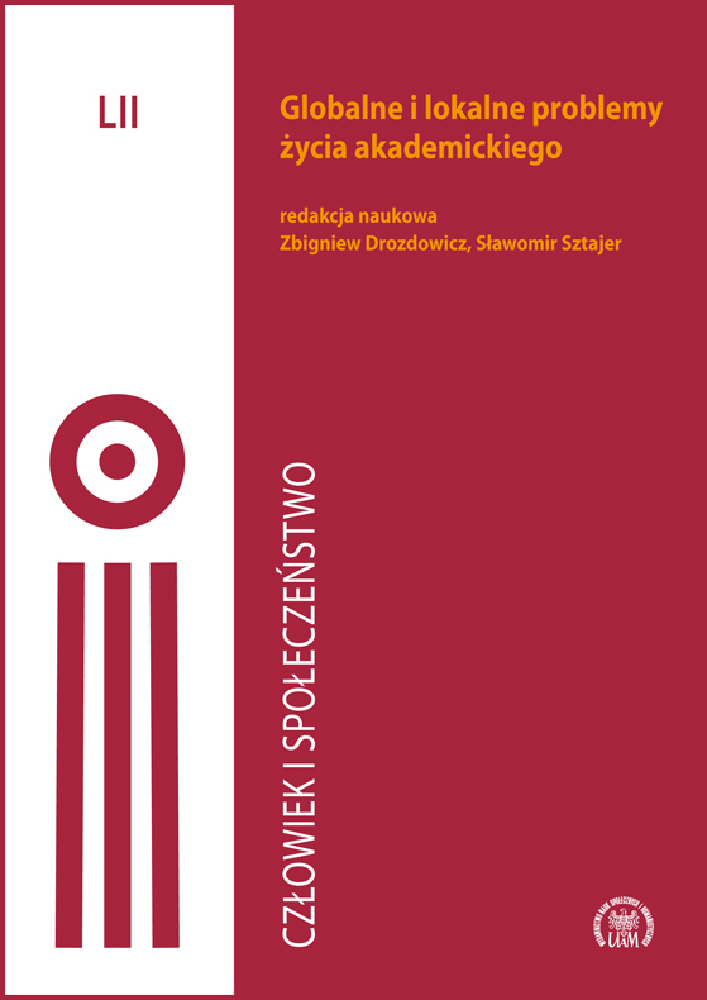Abstrakt
The article discusses the role of public intellectuals, with particular emphasis on scholars specializing in the study of religions. While various functions and aims of public intellectuals are taken into account, the article focuses primarily on risks related to scholars’ engagement in public discourse. The history of the academic study of religion shows that many of its representatives were involved in various ideological endeavors, including political ideologies. It is argued that the main role of the public intellectual in the study of religion is not to be a functionary of religious institutions nor even an interpreter of religious traditions, but a critical researcher who impartially popularizes knowledge about religions and highlights the mechanisms underlying the dynamics of the religious world.
Bibliografia
Allen, D. (1994). Recent defenders of Eliade: A critical evaluation. Religion, 24, 333–351.
Bronk, A. (1996). Nauka wobec religii. Lublin: Towarzystwo Naukowe KUL.
Dawkins, R. (2007). Bóg urojony, Warszawa: Wydawnictwo CIS.
Dubuisson, D. (2014). Twentieth Century Mythologies. London–New York: Routledge.
Eliade, M. (1997). W poszukiwaniu historii i znaczenia religii. Warszawa: Wydawnictwo KR.
Etzioni, A., Bowdith, A. (2006). Public Intellectuals: An Endangered Species? Lanham: Rowman & Littlefield Publishers.
Fisher, E. (2010). Fascist scholars, fascist scholarship: The quest for ur-fascism and the study of religion. W: Ch.K. Wedemeyer, W. Doniger (red.), Hermeneutics, Politics, and the His-tory of Religions: The Contested Legacies of Joachim Wach & Mircea Eliade (ss. 261–284). Oxford: Oxford University Press.
Foucault, M. (1988). Politics, Philosophy, Culture: Interviews and Other Writings 1977–1984. London: Routledge.
Ioanid, R. (2004). The sacralised politics of the Romanian Iron Guard. Totalitarian Movement and Political Religions, 5(3), 419–453.
Jennings, J. (2002). Death of the intellectual: A comparative autopsy. W: H. Small (red.), The Public Intellectual (ss. 110–130). Oxford: Blackwell.
Joffe, J. (2003). The decline of the public intellectual and the rise of the pundit (ss. 109–122). W: A.M. Melzer, J. Weinberger, M.R. Zinman (red.), The Public Intellectual: Between Philosophy and Politics. Lanham: Rowman & Littlefield Publishers.
Komaniecka-Łyp, M. (2021). Jan Kanty Wierusz-Kowalski – benedyktyn, tajny współpra-cownik, religioznawca i funkcjonariusz. W: Ł. Marek, R. Łętocha (red.), Ile z nauki, ile z ideologii? Religioznawstwo w PRL (ss. 267–295). Kraków: IPN.
Łętocha, R. (2021). Wizja zadań i celów religioznawstwa marksistowskiego na łamach czaso-pisma „Euhemer. Przegląd Religioznawczy” 1957–1989. W: Ł. Marek, R. Łętocha (red.), Ile z nauki, ile z ideologii? Religioznawstwo w PRL (ss. 129–137). Kraków: IPN.
Marek, Ł., Łętocha, R. (red.) (2021). Ile z nauki, ile z ideologii? Religioznawstwo w PRL. Kraków: IPN.
Martin, L.H., Wiebe, D. (2012). Religious studies as a scientific discipline: A persistence of a delusion. Journal of the American Academy of Religion, 80(3), 587–597.
McCutcheon, R.T. (1993). The myth of the apolitical scholar. Queen’s Quarterly, 100, 642–663.
McCutcheon, R.T. (1997). A default of critical intelligence? the scholar of religion as Public intellectual. Journal of the American Academy of Religion, 65(2), 443–468.
Michael, J. (2000). Anxious Intellectuals: Academic Professionals, Public Intellectuals, and Enlightenment Values. Durham–London: Duke University Press.
Nowicki, A. (1969). Centralne kategorie religioznawstwa marksistowskiego. Euhemer, 1–2(71–72), 3–17.
Posner, R.A. (2001). Public Intellectuals: A Study of Decline. Cambridge, MA: Harvard Uni-versity Press.
Said, E.W. (1996). Representations of the Intellectual: The 1993 Reith Lecture, New York: Vintage Books.
Smart, N. (1973). The Science of Religion and the Sociology of Knowledge. Princeton: Prince-ton University Press.
Strenski, I. (1987). Four Theories of Myth in the Twentieth Century: Cassirer, Eliade, Levi-Strauss, and Malinowski, Iowa City: University of Iowa Press.
Rennie, B.S. (1992). The diplomatic career of Mircea Eliade: A response to Adriana Berger. Religion, 22, 375–392.
Waardenburg, J. (1974). W sprawie fenomenologii religii. Uwagi zasadnicze. Euhemer – Przegląd Religioznawczy, 3(93), 73–87.
Weitzman, M. (2020). “One Knows the Tree by the Fruit That It Bears:” Mircea Eliade’s in-fluence on current far-right ideology. Religions, 11, 250.
Licencja
1. W momencie złożenia pracy celem rozpoczęcia postępowania w sprawie publikacji, Licencjodawca, zwany dalej Autorem, akceptuje wszystkie zasady umieszczone na stronie internetowej czasopisma “Człowiek i Społeczeństwo”, udzielając Licencjobiorcy, zwanego dalej Wydawcą, niewyłącznej i nieodpłatnej licencji na korzystanie z Utworu. Licencja zakłada tym samym brak ograniczeń terytorialnych, czasowych oraz ilościowych na następujących polach eksploatacji (art. 50 ustawy z dnia 4 lutego 1994 r. o prawie autorskim i prawach pokrewnych):
a. utrwalanie Utworu;
b. zwielokrotnienie Utworu drukiem i w wersji cyfrowej;
c. wprowadzenie do obrotu, użyczenie lub najem oryginału/zwielokrotnionych egzemplarzy Utworu;
d. publiczne wykonanie, wystawienie, wyświetlenie, odtworzenie oraz nadawanie i reemitowanie, a także publiczne udostępnianie Utworu w taki sposób, aby każdy mógł mieć do niego dostęp w miejscu i w czasie przez siebie wybranym;
e. włączenie Utworu w skład utworu zbiorowego;
f. wprowadzenie Utworu w postaci elektronicznej na platformy elektroniczne lub inne wprowadzenie Utworu w postaci elektronicznej do Internetu, Intranetu, Extranetu lub innej sieci;
g. rozpowszechnianie Utworu w wersji elektronicznej w Internecie, Intranecie, Extranecie lub innej sieci, w pracy zbiorowej, a także samodzielnie w formule Open Access w oparciu o licencję Creative Commons Uznanie autorstwa 4.0 Międzynarodowa Licencja Publiczna (CC BY 4.0), a także inną wersję językową tej licencji, lub którąkolwiek późniejszą wersję tej licencji.
2. Założenia licencji Creative Commons Uznanie autorstwa 4.0 Międzynarodowa Licencja Publiczna (CC BY 4.0), udzielają Wydawcy upoważnienia do kopiowania, zmieniania, rozprowadzania, przedstawiania i wykonywania Utworu jedynie pod warunkiem uznania autorstwa.
3. Wraz z dostarczeniem Utworu, Autor zobowiązuje się do wypełnienia, podpisania oraz odesłania skanu umowy

